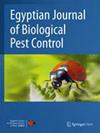Microbial antagonists: diversity, formulation and applications for management of pest–pathogens
IF 2.1
3区 农林科学
Q1 ENTOMOLOGY
引用次数: 0
Abstract
Abstract Agriculture is the backbone of developing countries, which plays an essential role in primary drivers of economy. The increasing use of chemical fertilizers and toxic insecticides endangers the health of human, plant soils, and the environment. Microbial insecticides have been implemented in current scenario for crop protection. Biological agents for pest control have gained more attention in recent year as substitutes for management of pests and pathogens. It provides a sustainable approach to plant health management and assists to minimize the excessive applications of toxic substances. The antagonistic microbes belong to six different phyla including Bacillota, Actinomycetota, Pseudomonadota, Bacteroidota and Mucoromycota. Microbial pesticides have been developed through a number of processes, including extraction of pure culture and screening using effectiveness bioassays under controlled and natural conditions. Biological control agents (BCAs) are recognized to be the most sophisticated technology for environmentally friendly agriculture. The various beneficial BCAs have been reported for the management of plant health, but they required effective acceptance together with the standardization of bioformulation. The present review deals with the recent development of microbial control agents, mechanisms of actions, development of microbial pesticides and their potential applications for agricultural productivity.微生物拮抗剂:多样性、配方及其在病虫害病原体管理中的应用
农业是发展中国家的支柱产业,在经济发展的主要动力中发挥着至关重要的作用。化肥和有毒杀虫剂的使用日益增加,危及人类、植物、土壤和环境的健康。微生物杀虫剂已在目前的作物保护方案中得到应用。近年来,生物防治药剂作为病虫害和病原体管理的替代品受到越来越多的关注。它为植物健康管理提供了一种可持续的方法,并有助于尽量减少有毒物质的过度使用。拮抗微生物属于6个不同的门,包括杆菌门、放线菌门、假单胞菌门、拟杆菌门和毛霉门。微生物农药的开发经历了许多过程,包括纯培养物的提取和在受控和自然条件下使用有效性生物测定法进行筛选。生物防治剂(bca)是公认的最先进的环境友好型农业技术。各种有益的bca已被报道用于植物健康管理,但它们需要有效的接受以及生物制剂的标准化。本文综述了微生物防治剂的最新进展、作用机制、微生物农药的发展及其在农业生产中的潜在应用。
本文章由计算机程序翻译,如有差异,请以英文原文为准。
求助全文
约1分钟内获得全文
求助全文
来源期刊
CiteScore
4.90
自引率
16.70%
发文量
128
审稿时长
>12 weeks
期刊介绍:
The Egyptian Journal of Biological Pest Control is a periodic scientific journal published by the Egyptian Society for Biological Control of Pests (ESBCP) in collaboration with SpringerNature. The journal aims to publish internationally peer-reviewed, high-quality research articles in the field of biological and integrated pest control (non-chemical control). The journal publishes review articles, original papers, conference reports, book reviews, editorials, laboratory reports, technical notes and short communications.

 求助内容:
求助内容: 应助结果提醒方式:
应助结果提醒方式:


